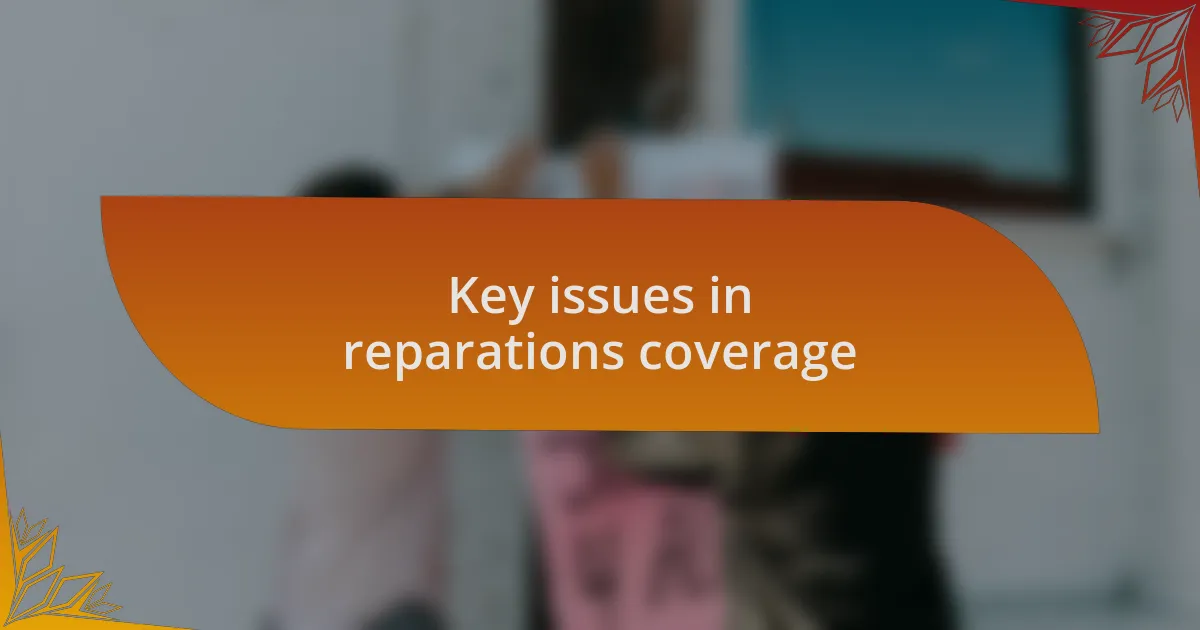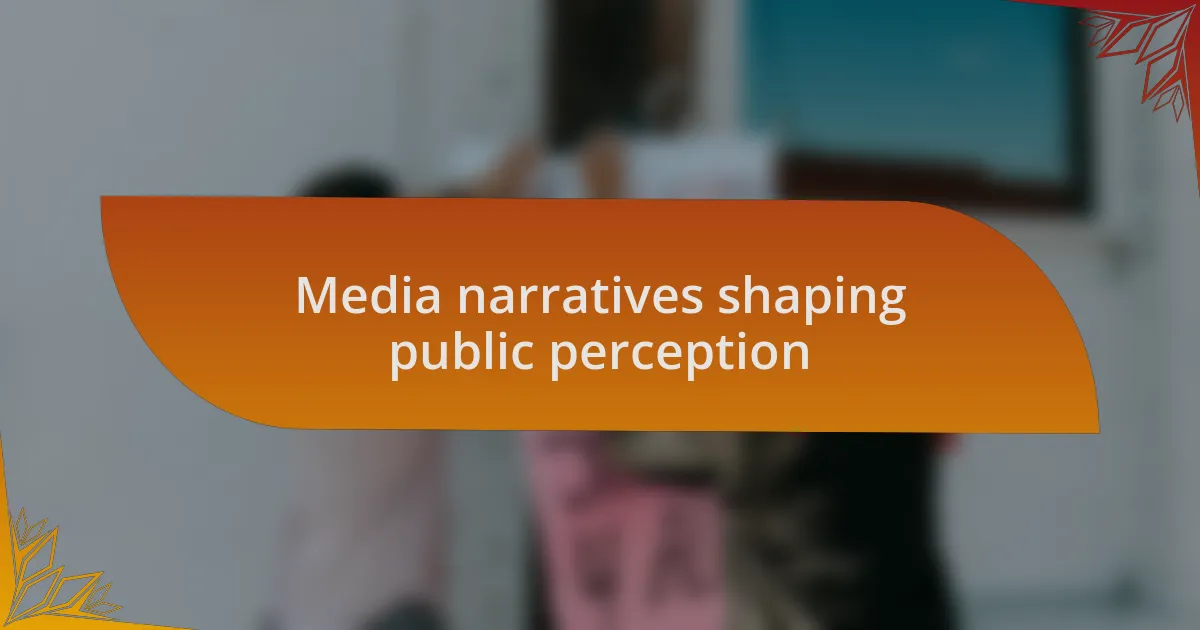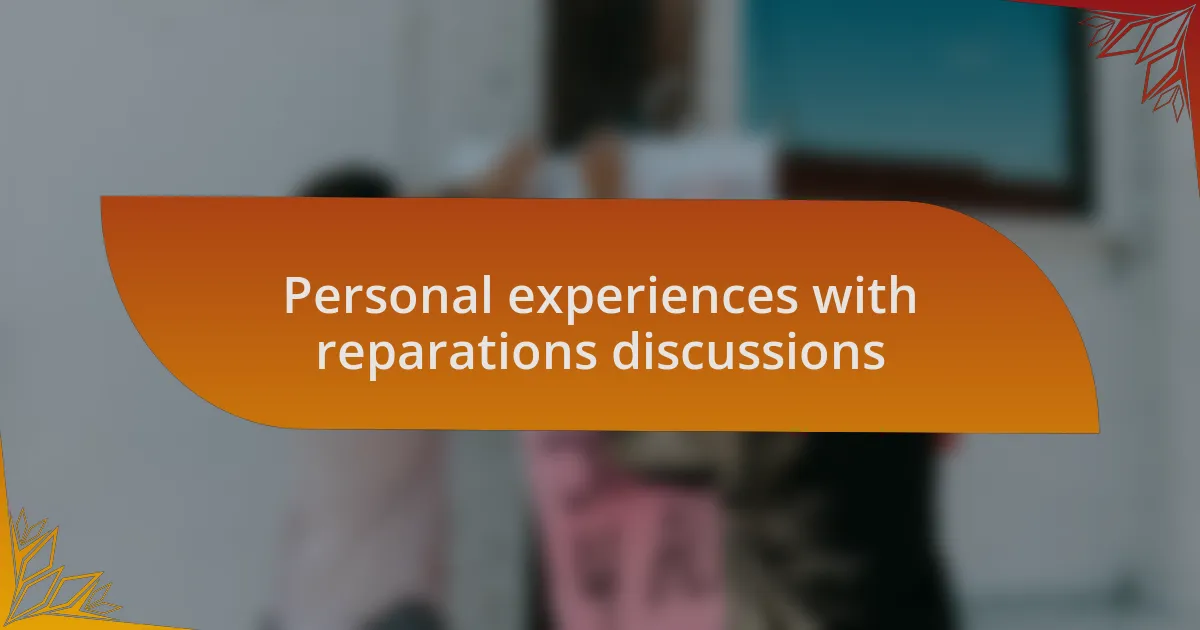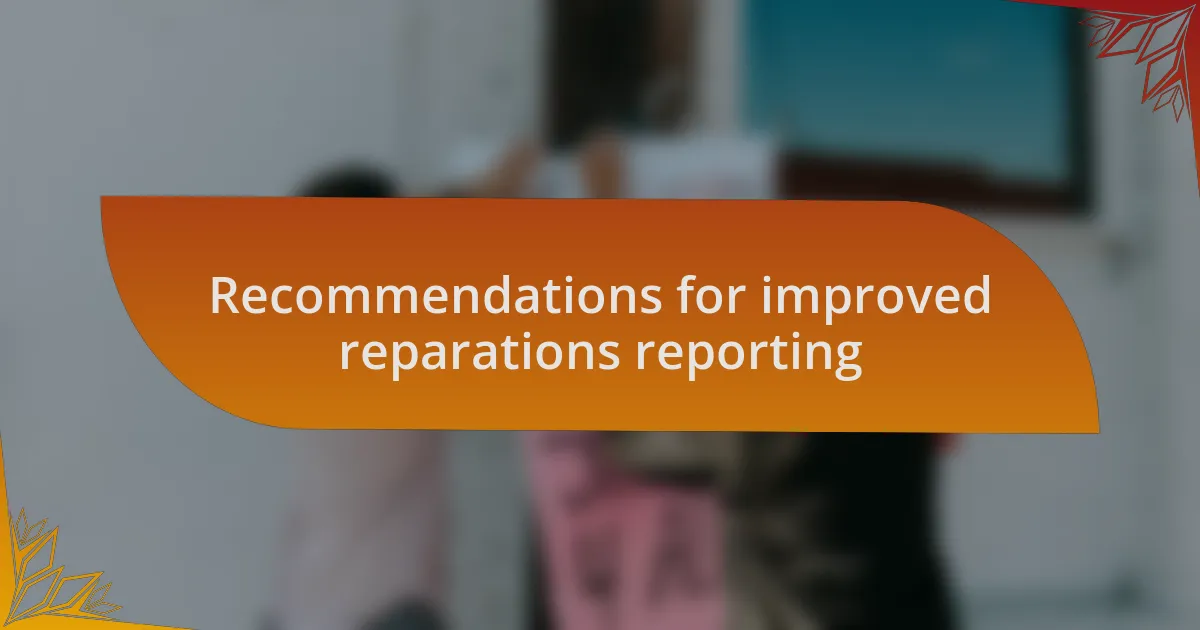Key takeaways:
- Reparations politics encompasses economic, social, and moral dimensions, highlighting the need for acknowledgment and healing from historical injustices.
- Media coverage often oversimplifies narratives and lacks diverse voices, which can lead to misunderstandings and deepen divisions rather than foster empathy.
- Personal stories and emotional storytelling are crucial in discussions about reparations, as they humanize issues and promote constructive dialogue.
- Improving reparations reporting requires focusing on real-life implications, including diverse perspectives, and ensuring transparency in funding and policy discussions.

Understanding reparations politics
Reparations politics is often framed as a response to historical injustices, particularly regarding slavery and systemic racism. I vividly remember attending a town hall meeting on this topic, where passionate voices shared their stories of trauma and resilience. Listening to these personal accounts made me realize how deeply intertwined reparations are with our collective memory and responsibility.
Delving into this issue reveals a complex interplay of economic, social, and moral dimensions. Why do some people see reparations as a means of healing, while others view them as divisive? In my experience, discussions often become heated, reflecting not just differing opinions but also the pain of a history that continues to echo in the present.
As we unpack reparations politics, it becomes clear that it’s not merely about financial compensation. It’s a call for acknowledgment, restitution, and a chance to build a more equitable society. I often wonder—can genuine reconciliation occur without addressing these past wrongs? Each step in this conversation stirs emotions and challenges us to rethink our role in shaping a future that honors every individual’s dignity.

Key issues in reparations coverage
When examining the media coverage of reparations, one common issue is the oversimplification of narratives. I recall reading articles where complex histories were reduced to mere sound bites. Such reduction often strips away the emotional weight behind these stories and misses the essence of what reparations truly represent—an acknowledgment of pain and a commitment to healing.
Another key issue is the lack of diverse voices in the discussion. In my experience, I’ve watched many panels and interviews where the same perspectives dominate the conversation. This exclusion can lead to a skewed understanding of reparations, failing to capture the full spectrum of opinion and lived experiences. How can we genuinely engage with such a multifaceted topic if we’re not hearing from all sides?
Moreover, the portrayal of reparations in the media sometimes leans towards sensationalism, creating a narrative that can incite fear rather than foster understanding. I’ve noticed this during heated debates on social media, where inflammatory statements overshadow thoughtful discussions. Isn’t it crucial for the media to facilitate dialogues that encourage empathy instead of deepening divisions? Addressing these issues in media coverage is essential for fostering a more informed and compassionate discourse on reparations.

Media narratives shaping public perception
When I think about media narratives shaping public perception around reparations, I often reflect on how powerful stories can alter minds. I remember sitting with friends during a documentary screening that aimed to unpack reparations. We discussed how the film’s emotionally charged portrayal of historical injustices sparked a deeper understanding among viewers, making the conversation feel much more tangible and urgent. Can the media harness this emotional storytelling to help bridge the gap between understanding and action?
Additionally, I’ve witnessed the impact of framing. Articles that use terms like “payback” or “handouts” can invoke a visceral emotional reaction, often painted in a negative light. I’ve seen how these loaded words can create resistance rather than receptivity. Isn’t it vital for the media to choose language that promotes dialogue rather than shutting it down? Words matter, especially in a discourse so deeply tied to historical trauma.
It’s fascinating to see how media coverage can inspire empathy or breed fear—all depending on the narrative angle taken. I recall engaging in discussions online where one well-placed article shifted the tone of conversation dramatically, emphasizing shared human experiences instead of conflict. In my view, the media holds immense responsibility to shape narratives that encourage unity and understanding rather than division. How can we expect progress without narratives designed to uplift and educate the public?

Personal experiences with reparations discussions
In my own experience, discussions about reparations often reveal a spectrum of emotions. I remember a heated debate with my family during a holiday dinner, where my younger cousin passionately advocated for reparations as a form of justice. His conviction reminded me how different generations perceive these issues, raising a question for me: How do our personal backgrounds influence our stance on historical reparations?
Another memorable moment occurred during a community town hall meeting I attended. When a resident shared their family’s story of generational struggle and poverty, it created a palpable shift in the room. As tears were shed, I felt the walls of indifference crumbling. It struck me that stories of real people can humanize abstract concepts like reparations, compelling us to reconsider our positions. How often do we let numbers and statistics overshadow the human experience behind them?
I also recall an informal gathering of friends where we attempted to untangle the complexities of reparations over coffee. Amid a relaxed setting, I found it interesting how perceptions shifted when we focused on empathy and understanding rather than blame. It became clear to me that personal stories and a willingness to listen could provide pathways to constructive dialogue. Why does it take moments of vulnerability for us to truly connect and engage with challenging subjects?

Recommendations for improved reparations reporting
When it comes to improving reparations coverage, I believe that media outlets should prioritize stories that highlight real-life implications. For instance, I once read an article that followed the personal journey of a family directly impacted by historical injustices; it resonated deeply with me. By focusing on individual narratives, the media can evoke empathy and foster a nuanced understanding of the reparations debate.
Moreover, I think it’s crucial for reporters to engage with a diverse range of perspectives. While I appreciate expert opinions, I’ve often found that community voices bring richness to the discourse. For example, participating in a community workshop brought to light the varied views held by people from different backgrounds, reminding me that repair efforts are not a one-size-fits-all solution. Why should the media not capture the full spectrum of these voices?
Finally, transparency in reporting on reparations is essential. I’ve learned that clarity around funding and policy proposals plays a significant role in shaping public opinion. When I came across a detailed breakdown of a city’s reparations plan, it made me feel more informed and empowered. Shouldn’t the public have access to comprehensive information that fosters informed discussions and encourages meaningful action?